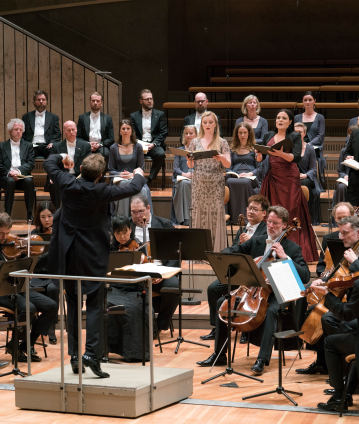A Mozart evening with Daniel Harding

Mozart’s C minor Mass is one of the most beautiful works of sacred music ever composed. Choruses of archaic power strikingly alternate with graceful solos, which are perhaps so inspired because Mozart wrote one of the soprano parts for his wife Constanze. Conductor Daniel Harding devotes the rest of the concert to the secular Mozart with the brief, exuberant Symphony No. 32 and two expressive concert arias.
Wolfgang Amadeus Mozart’s C minor Mass K. 427 exists only in incomplete form: in addition to the autograph score, there are surviving orchestral parts edited by Mozart for the Salzburg premiere of the work in 1783 which was presumably fleshed out with movements from other mass settings. Two years later, the composer then used the work fragment as the basis for Davide penitente, a cantata to an Italian libretto paraphrasing biblical psalms. This recycling points to a characteristic of the music of Mozart, whose compositional technique incorporates a wide range of styles: it combines the strict compositional techniques of works in the style of Johann Sebastian Bach and George Frideric Handel with very sensuous moments more usually heard in the opera house. It is also clear from a letter written by the composer’s sister that Mozart wrote one of the most vocally gratifying soprano parts of the C minor Mass for his new bride, Constanze: in October 1783, Anna Maria Mozart, known as “Nannerl”, wrote to family about rehearsals for a mass setting “in which my sister-in-law sings the solo”. Vocal parts written by a Salzburg copyist which contain corrections in Mozart’s own hand prove that this must have referred to the C minor Mass.
According to Alfred Einstein, one of the most beautiful passages that Mozart wrote specifically for his wife’s voice – the Siciliana-style “Et incarnatus est” section – has long been a “bone of contention for purists of sacred music”. However, the prominent Mozart scholar took the wind out of the sails of any objections to the stylistic transgressions of the C minor Mass with a reference to the visual arts: “If a piece of music like this must be excluded from the church, so should the circular panels by Botticelli depicting the infant Christ surrounded by Florentine angels; it is just as profane.”
Against this background, it will be doubly exciting when, in these Berliner Philharmoniker concerts under the direction of Daniel Harding, the performance of the C minor Mass is preceded by an orchestral work and two concert arias by Mozart. Appearing together with the Berliner Philharmoniker are the Swedish Radio Choir and a first-class quartet of soloists with Lucy Crowe, Olivia Vermeulen, Andrew Staples and Georg Zeppenfeld.
© 2018 Berlin Phil Media GmbH
Related interview
Artists
Our recommendations
- John Eliot Gardiner conducts Brahms and Mendelssohn
- Sir Simon Rattle and the Orchestra Academy perform Mahler’s “Das Lied von der Erde”
- John Eliot Gardiner conducts Stravinsky
- Simon Rattle conducts Ginastera and Britten
- Simon Rattle conducts Schumann’s “Paradise and the Peri”
- Mikko Franck conducts Schumann’s “Paradise and the Peri”